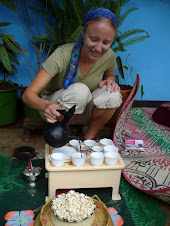Out of all my projects during my Peace Corps service to date, I think none has taught me more than the mill IGA project. Also, I believe none has made me feel more conscious of being an American. Business practice and philosophy is one of those areas in which the cultural divide really makes itself known, and on frequent occasions with the mill project, I have been aware of stark differences between my perspective and that of my Ethiopian counterparts. I was often frustrated and put off by two-or-three-hour meetings in which the group, seemingly to me, did nothing but bicker back and forth about so-and-so who hadn’t done such-and-such and why and what should happen and so on and so on and so on… When I confronted the RINA coordinator about these constant arguments, though, expressing my concern that such issues should fall under the jurisdiction of the group governance rules that should have been set forth CLEARLY from the beginning, he turned the tables on me by expressing his concern that my strategy was much too impersonal. Issues among the group members, he told me very seriously, are better resolved in the sessions I was seeing, with extensive discussions and with decisions being made on a case-to-case basis.
Another similar instance came during our financial planning discussions. After deciding the percentage of profits to be given directly to group members for their labor and participation, the group had to make a decision as to how their wages would be distributed to each individual member. Considering the lengthy, fairly heated arguments I had witnessed surrounding members failing to do their expected work, I suggested that the wage received by each member would be proportional to the work they had done – a fairly commonsense notion in my American capitalist eyes. But the group insisted that each group member, as an equal, should receive an equal cut of the profits, and that the group would “encourage and motivate” members to fulfill the expectations for an equal share of the work. Having made my strong suggestion as to which system might make the enterprise run most smoothly, but acknowledging that the venture is ultimately the group’s and not mine, I relented to the group’s wishes, provided that the group members themselves would take responsibility for enforcing a fair distribution of the workload – and not present complaints to me in long, angry sessions.
In the U.S., we say it’s just business, it’s not personal. In Ethiopia, business is typically thoroughly personal, relying not so much on structures, rules, market-based dictates of demand and pricing, as on interpersonal relationships, arrangements, and understandings. It’s yet another case of the balance that we Peace Corps volunteers must constantly strike between respecting the local culture and yet also providing the technical advice that the Ethiopian government has asked us here to supply. It’s not always easy to tell when I should yield to the local way of thinking and when I should really push for what seems most efficient to me. I think that I’ve walked that tightrope fairly well throughout the course of this mill project, but I suppose only time will really tell.
In the meantime, the group members and I continue to be pleased with the mill’s success, and I’m very proud of what we’ve been able to accomplish together.
skip to main |
skip to sidebar

Modern Tales of a Southern Girl in an Ancient Land

My Ethiopia Photos
- My Welliso Pics
- More Welliso Pics
- Other Welliso Pics
- Last Night in Welisso
- Peace Corps Swear-In
- Life in Debremarkos Pt. 1
- Life in Debremarkos Pt. 2
- Little Travels Around Ethiopia
- Sodere and In-service training
- Simien Mountains
- Gonder
- World Cup Qualifier
- More from Markos
- Welliso Wedding
- Bahirdar Fun
- Here and There
- Excursion into the Hills
- Lalibela
- Round and About
- Timkat In Gonder
- Life Continues in Markos
- Fasika in Assela
- Shashemane, Wolaita, Arba Minch
- Mertolemariam
- Bale Mountains
- Random Others
- Up North
- Out West
Blog Archive
About Me
I'm here in Ethiopia for the next couple of years. I'm experiencing new things, encountering new ideas, and generally trying to sort out myself and the world around me. I'm meeting new people, discovering their stories, and opening myself up to be profoundly impacted by them. Hopefully along the way I'll do some good.
Disclaimer
The views expressed on this site are mine alone and do not necessarily represent the opinions of the Peace Corps or the governments of Ethiopia or the United States.
My Address
Christen Marie
P.O. Box 141
Debremarkos
Ethiopia
P.O. Box 141
Debremarkos
Ethiopia
No comments:
Post a Comment